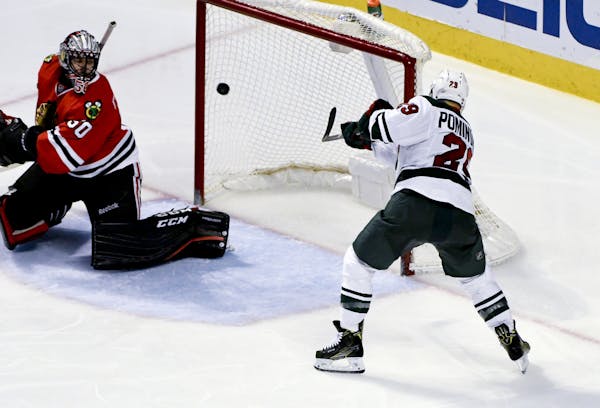Eight consecutive regular-season losses to the Wild, six points back in the Central Division standings, the Chicago Blackhawks claimed Wednesday night's meeting was their "biggest game of the season."
Bruce Boudreau chuckled at the notion two hours before the game.
"They're lying, they're lying. They're just trying to make us feel good," the Wild coach said.
The Blackhawks have won three Stanley Cups in seven years and eliminated the Wild in the 2013, 2014 and 2015 playoffs, so the cynical coach didn't buy that the Blackhawks were using the Wild, even with its impressive season, as a measuring stick.
A few hours later, the lone NHL game and one nationally televised on an evening made longer by a bizarre six-minute offside challenge, the Blackhawks beat the Wild 4-3 in overtime to pull within five points of the conference leaders.
Jonathan Toews, part of a star-studded 4-on-3 power play with Patrick Kane, Artemi Panarin and Duncan Keith, capped a three-point game with the winning goal 3:09 into overtime after a Ryan Suter holding penalty.
"That's a pretty good team to have on the power play with 4-on-3 for two minutes," Boudreau said.
The Wild was able to get a big point, however.
With the Wild outchancing and outshooting the Blackhawks only to be stymied by a focused Corey Crawford, Erik Haula, playing on the fourth line, scored the tying goal with 3:03 left in regulation. Defenseman Marco Scandella skated through center ice, into the offensive zone and put it on a tee for a charging Haula at the goal mouth.
"It was kind of a playoff game environment," Haula said. "It's always fun when you play those guys. We've had their number lately, and I thought it was a really big point for us."
The turning point, Boudreau felt, came during a 19-shot second period. The Wild rallied from a 2-0 deficit on goals by Jared Spurgeon and Zach Parise, but usually when the Wild is buzzing, it gets three or four goals quickly. Crawford was stellar though and also made three saves in overtime, including one on a Suter breakaway.
"I don't think we get too far in that game if he doesn't make some of those big stops," Toews said.
Minnesota was opening an eight-game homestand against a rested Blackhawks team that hadn't played since Saturday. By contrast, the Wild played the night before to end a four-game, nine-day trip.
"We tried to wear them down, but obviously it's a team that works pretty hard. They didn't go away," Toews said.
The regular-season loss to Chicago was Minnesota's first since Jan. 11, 2015 — two whippings before the Devan Dubnyk era began. Dubnyk didn't get Wednesday's start. Boudreau started Dubnyk the night before in Winnipeg because he had an inkling Dubnyk would need to bail out his tired team. He did, and with a 16-point lead on a playoff spot, the Wild is not going to risk his health by playing him back-to-back in Game 53.
So, Darcy Kuemper got the nod. Boudreau also felt Parise and Eric Staal were fatigued in Winnipeg, so he wanted to split them up against the Blackhawks, which triggered three line changes.
For the second game in a row, a Charlie Coyle-centered line was surging from the outset. Parise could have had a couple of goals in the first period. But after Spurgeon cut the deficit to 2-1 37 seconds after a Nick Schmaltz goal, Coyle set up Parise for a tying goal.
But Blackhawks coach Joel Quenneville challenged that the entry into the zone was offside. The review, featuring linesmen Ryan Daisy and Brian Mach, not only took 6 minutes, 10 seconds, there was a technical malfunction and Daisy had to borrow a press-box attendant's iPhone to talk to the NHL Situation Room in Toronto.
The linesmen ultimately ruled that it was inconclusive whether Parise tagged up at the instant the puck touched Coyle's stick at the blue line.
"I didn't think it was going to count, to be honest. We've got that TV behind our bench," Parise said.
The Wild wanted two points. It'll take the one. Boudreau told his players they deserve Thursday's planned off-day.
"It'd be like getting blood out of a stone if we were to practice them," Boudreau said. "I think they left it all on the ice, as I think Chicago did."
Olympic organizers unveil strategy for using artificial intelligence in sports
Former Cooper football star Howard transfers from LSU to Gophers
Chinese Grand Prix could deliver drama to F1 and slow Verstappen's victory march

